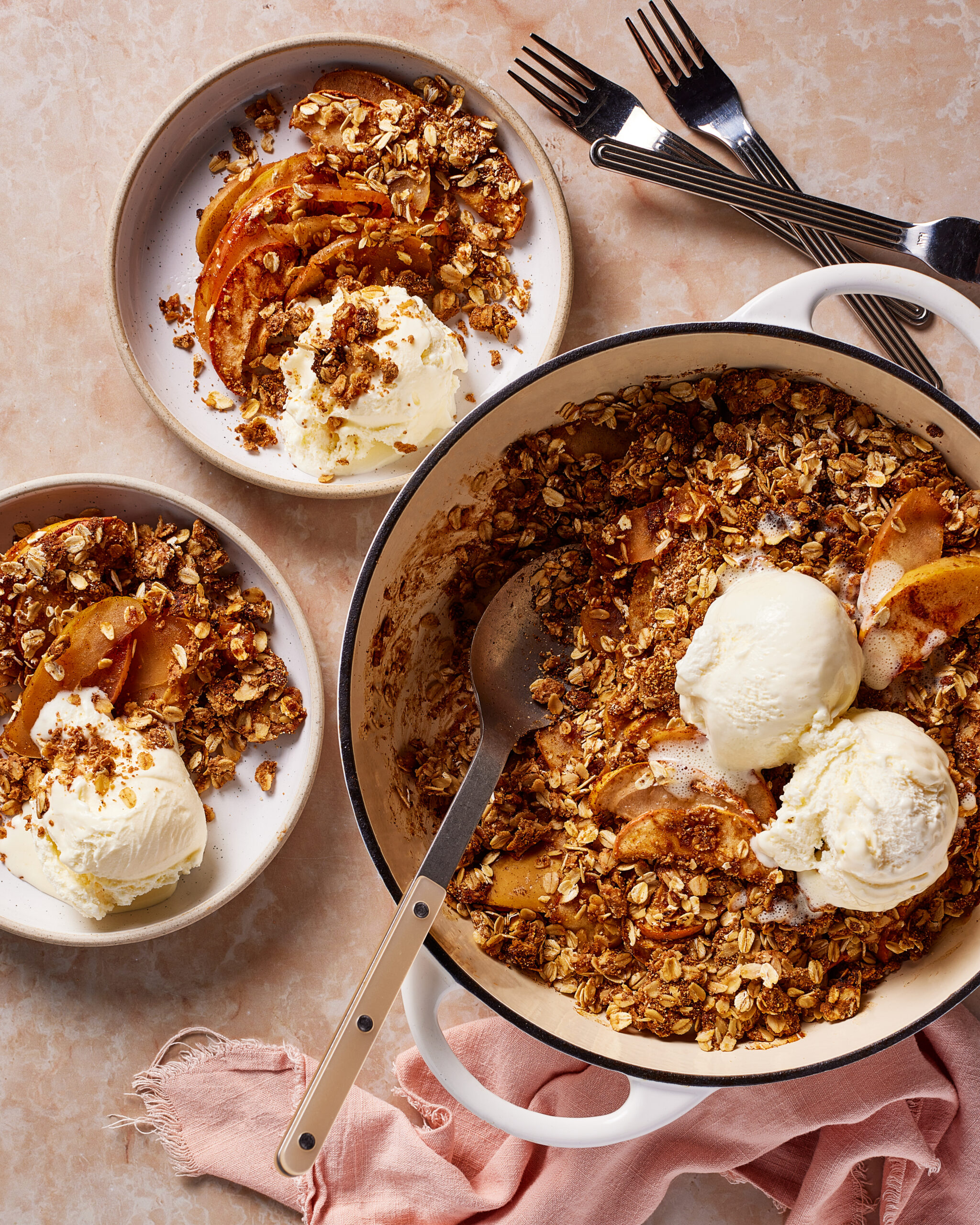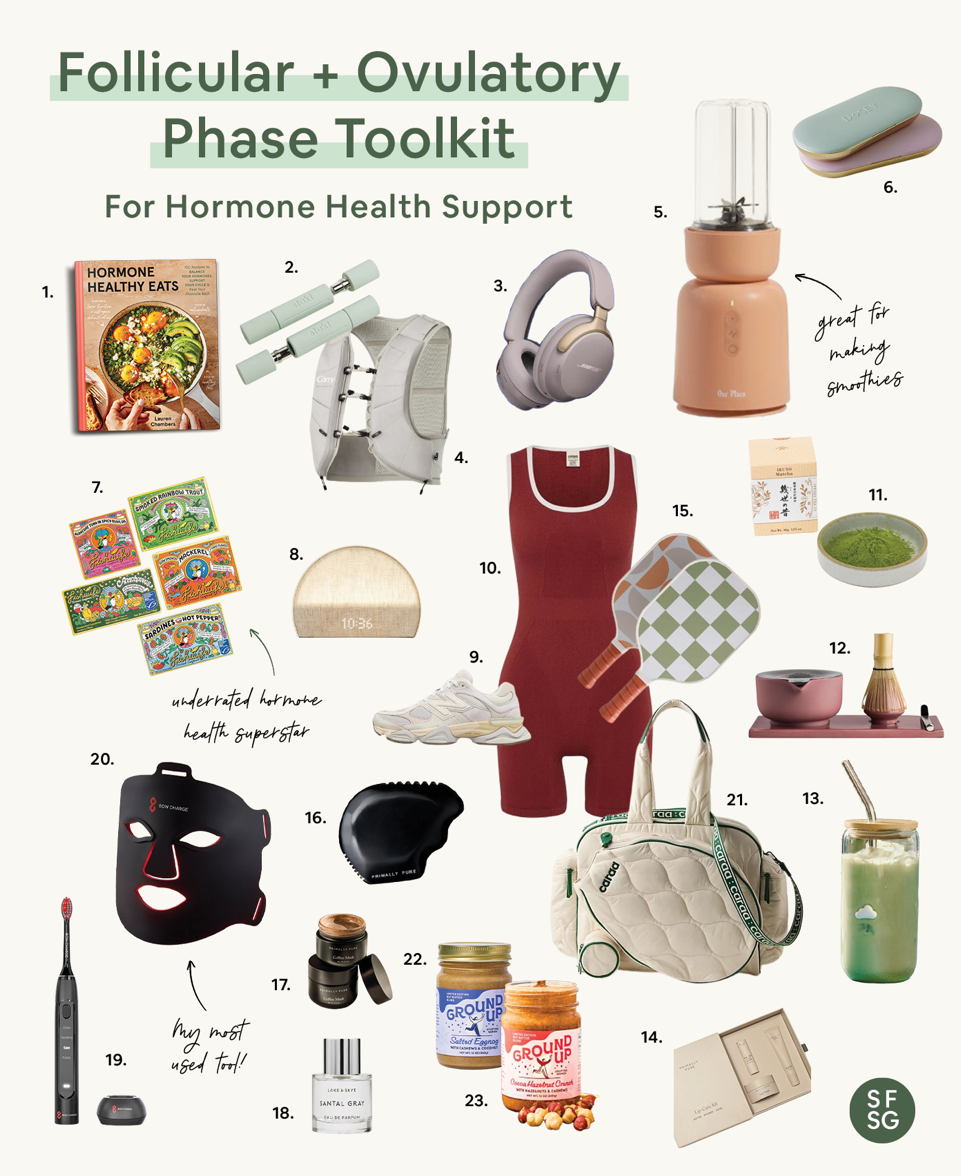recipes
lifestyle
wellness
motherhood
mindset
About
E-Books
Blog
Freebies
partnerships
hi, i'm lauren!
hey there!
I’m on a hot mission to help you balance your hormones & live your best life.
categories
Home
Quiz
Get In Touch
The Course
search:
Cookbook
My Postpartum Recovery — Recipes, Products, Tools + Tips That Helped Me Balance My Hormones & Feel My Best
Apr 4, 2019
Recipe key
GF
VG
P
Vegan
Gluten Free
Paleo
DF
Dairy-Free
download now
Join Hormone Healthy Eats!
Become a SFNSG insider to get my monthly Substack, Hormone Healthy Eats! Packed with the latest hormone-healthy recipes
+ tips.
jump to recipe >
First and foremost — I want to preface this post with the disclaimer that every woman’s pregnancy, birth and postpartum experience is totally unique, and what I found to be helpful may not be the best for everyone else.
While it’s not within my scope of practice to diagnose, it IS within my training to support clients through hormonal imbalances, including shifts that occur in relation to pregnancy and postpartum. My goal with this post is to share what I personally found helpful (in the case some of you might too) as well as drop some knowledge I commonly share with clients and in my practice as it relates to hormone health (so you can do with it what you will :)).
MY PERSONAL POSTPARTUM JOURNEY
REAL TALK — I was super nervous for what’s commonly known as “The Fourth Trimester.” While I was excited to meet my baby (and also not be pregnant anymore TBH) I knew from my training the huge hormonal shifts that occur in women’s bodies post-birth sets us up for a number of not-so-fun common symptoms. Think headaches, night sweats, low-energy, constipation, mood swings, brain-fog, anxiety and depression — and that’s not even getting into the physical trauma your body experiences after giving birth!
So, I took it upon myself to prepare myself physically. mentally and emotionally as much as possible, and it was a game-changer for me. While your birth experience and babies in general require you to relinquish some control and take things as they come (nature has it’s own game plan FYI), it was super helpful for me to go into it having an idea of what might happen on the other side, so that I could do everything possible to minimize any negative symptoms and feel good enough to focus on a super special time in my life.
So how did it go? Well birth was truly gnarly (check out this post to read my candid pregnancy + birth story) but also gave me a whole new appreciation for my body and women in general! And my “fourth trimester” went better than I could have ever anticipated.

Sleep Deprived, But SO Worth It
While I was definitely sleep-deprived, overall physically and emotionally I felt so good. My moods were stable, my energy levels managed fairly well (especially in regards to the no sleep aspect), my body healed incredibly quickly, and while everything was new, scary and different (especially putting Eloise in that car seat for the first time) I felt like myself through it all, allowing me to be present and enjoy my new role as a mom.
ON BODY IMAGE + PHYSICAL HEALING POSTPARTUM
Because I feel like it’s so important to keep it real with you, I can’t write this post and not mention the fear I felt over how I would look and physically recover post-birth. As someone who spent 10 years of my life obsessing over diets and fostering an unhealthy relationship with food and my body, there were some mental hurdles I had to overcome throughout this journey.
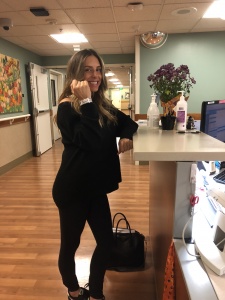
GO TIME (i.e. the day I gave birth)
Well, in my experience, the better you take care of your body, the more it will take care of you. I was shocked with how quickly I recovered, and within a matter of days my stomach had returned to it’s normal shape and size. At my six week checkup I was back at my pre-birth weight, and I was definitely not on a diet or exercising. I say this not to be boastful, but I think taking care of myself well during my pregnancy and postpartum really helped speed up my recovery and bounce back quickly physically.
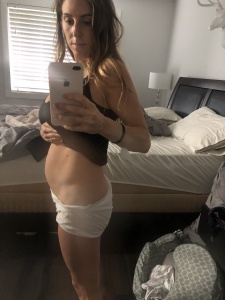
2 Days Postpartum — Gotta love those hospital undies
The honest truth — I didn’t focus on “losing my baby weight” or getting back to my “pre-baby body” once — I just put in effort to take care of myself physically, mentally and emotionally and do things that made me feel good. I truly believe in this approach for living a healthy, happy life in general, and hope some of what helped me below might resonate, inspire or support you in some way too!
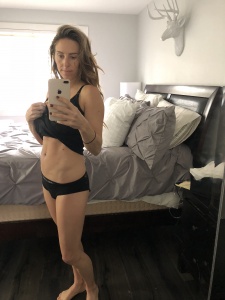
2 Weeks Postpartum Recovery — Slightly Better Undies
So before we get into all the good stuff, a quick recap on what happens to your body and hormones postpartum.
WHAT HAPPENS TO WOMEN’S HORMONES POSTPARTUM
As you can imagine, your body goes through a ton of changes during pregnancy and to prepare for birth. A huge part of this is the role your hormones play.
Progesterone Plummets
The most common hormonal shift women experience that tends to cause unwanted symptoms postpartum is estrogen dominance. During your pregnancy, progesterone levels rise significantly to prepare your endometrium to feed your growing fetus. Your estrogen levels also rise, and are highest right before labor. As long as there is a proper balance between estrogen and progesterone, things remain in equilibrium and “balanced.”
Immediately after you give birth to your placenta, your progesterone levels plummet back to what they were pre-pregnancy as your estrogen levels remain high. Progesterone is known for it’s calming, mood elevating effects, so such an immediate and dramatic drop in this hormone can cause mood shifts that range from the baby blues to full-on postpartum depression.
Estrogen Dominance
Your hormones will typically stabilize within the first couple of weeks, but if estrogen levels continue to stay high in relation to progesterone (which is now very common due to our exposure to estrogen-disrupting xenoestrogens like BPA and phthalates, as well as alcohol, birth control and other outside sources that tax our liver) you’ll experience estrogen dominance symptoms, such as mood swings, insomnia, irritability, depression, brain fog, fatigue, head aches, water retention and bloating.
Under Active Thyroid aka Hypothyroidism
Symptoms of low-thyroid or hypothyroidism commonly include constipation, fatigue, weight gain (or inability to lose weight), dry skin, brittle hair or hair loss, high heart rate, tremors and cold intolerance.
Bottomline
Many of the postpartum symptoms women commonly experience are due to an imbalance of estrogen in relation to progesterone (i.e. estrogen dominance), adrenal fatigue and under active thyroid. Make sure to see your doctor if you experience any of the symptoms mentioned above and read below for tips to naturally balance your hormones and feel your best postpartum.
FAVE POSTPARTUM FOODS + RECIPES FOR BALANCING HORMONES
One of the most impactful steps you can take to prevent estrogen dominance, worn out adrenals, an under active thyroid or postpartum symptoms in general is to replete and rebuild your micro and macronutrients (which are the building blocks of your hormones and become extremely depleted post-birth). Here were my favorite tasty ways to nourish my body and balance my hormones.
+ It takes a village
People want to help out however they can, and asking them to bring a dish or meal is an excellent way to ensure you’re getting the nutrients you need to function optimally while still prioritizing rest and recovery. I cooked a bunch of meals to store in the freezer prior, but also sent recipe ideas to those who offered to help.
+ Oats
I had my mom make my recipe for this Make-Ahead Apple Pie Oatbake two weeks in a row, and then I started making it once a week every week thereafter. Not only are oats awesome for boosting your milk supply, but they contain b-vitamins to restore energy and keep your estrogen levels in check. I loved this recipe because it tasted so insanely delicious and one batch covered my breakfasts for the week.
+ Soups with Bone Broth
If you’ve been around for awhile, you know I love me some soup. Soups are simple to make (especially if you have an instant pot!), they freeze well, and they can be incredibly nutrient dense. My favorite recipes included this eggplant curry, turkey + sweet potato chili and a chickpea, cauliflower and coconut curry. I used bone broth in all the recipes, which is a rich source of minerals like calcium, magnesium and phosphorus to help you produce even more nutrient-rich breast milk.
+ Keto Broth Cups
While these are new on the market and I just recently tried them, I’ll definitely be using them the second time around (if there is one :)). They’re the easiest thing on the planet to make (just heat and drink) and are rich in gelatin, collagen, amino acids and nutrients to boost your immunity, heal your gut and keep you satiated until you’re able to squeeze in a meal (crucial for nursing mamas).
+ Postpartum Dark Chocolate Chunk Nut Butter Balls
No-bake, one-bowl and just 5 minutes to make (+ 30 minutes of chilling in the fridge) — count this nutrient-dense, satisfying snack as your new PP best friend. They taste like cookies and are filled with healthy fats to help repair your nervous system and brain, as well as oats and fiber to boost milk supply, restore gut health and help with elimination.
+ Bulletproof Coffee + Maca
I love bulletproof coffee because it’s easy to make, tastes creamy and delicious and is rich in short-chain fatty acids, which provide immediate energy for the body to use (so necessary when you’re a new mom and nursing). I like to add a tsp of maca root for a caramel-like flavor and hormone-balance boost, as it stimulates the hypothalamus and pituitary glands, which regulate your adrenals, thyroid, pancreas and ovaries.
+ Healthyish Hot Cocoa
TRUE STORY — While I’m loving the lighter, longer days of spring I’m almost sad winter is ending because it feels weird to drink my hot cocoas now (LOL the struggle is real). BUT I drank these all through winter and postpartum and the balance of healthy fats (nut butter and coconut oil), mineral and vitamin-rich nut milk, gut-healing spices and collagen and magnesium-rich dark chocolate made me feel incredible (not to mention it just felt decadent and cozy to indulge in).
While I don’t always recommend it, I did find beverages more enticing to make PP (they’re not only easy but highly effective in sneaking in nutrients like collagen, spices, adaptogens, etc.)
+ Convenience Foods/Snacks
I loved the convenience of these Purely Elizabeth Coconut Turmeric Oats and brought them with me to the hospital to snack on (along with RX’s Vanilla Nut Butter for topping). Bulletproof’s Collagen Cookie Dough Bars were great in a pinch, as was a cup of warm bone broth.
I’d also have my hubby pick up an organic rotisserie chicken, roasted root vegetables and tahini dressing from Whole Foods, then toss it all into a bowl with avocado for a quick meal filled with healthy fats, protein and fiber.
I majorly craved dark chocolate during this time, which makes sense given that it’s rich in magnesium, a building block of your “happy hormone” serotonin, which is crucial for calming the brain and promoting relaxation and helps to combat preeclampsia, cramping, insomnia, mood swings and headaches. I stocked up on Honey Mama’s dark chocolate fudge bars as well as Hu Kitchen’s (both are naturally sweetened and contain zero cane sugar or emulsifiers).
FAVE POSTPARTUM SUPPLEMENTS FOR BALANCING HORMONES
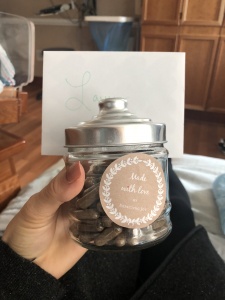
Could these placenta pills BE any cuter? 🙂
+ Placenta Pills
I knew I’d get some flack from my friends for this one but I DGAF. Placenta Encapsulation, a technique derived through Traditional Chinese Medicine, is becoming more mainstream as some research shows it could help alleviate postpartum depression. Because the placenta is home to a ton of nutrients in your body during pregnancy (that are then lost after birth) , consuming your placenta via pill form is thought to replenish you with nutrients to balance your hormones and increase milk production.
Some say it’s total BS, but placebo effect or not I wasn’t NOT going to try it. I did my placenta encapsulation service through Expecting Joy and loved it. They came to the hospital to pick up my placenta and brought it back the next day in the adorable jar pictured above. I just had to keep them in the freezer and take daily, and NO they did not smell or taste like anything. While I don’t have any other pregnancies to base my experience off of, I suspect these helped me during the first few weeks!
+ GOOP The Mother Load Supplement Subscription
This powerful postnatal vitamin provides comprehensive postpartum support — including many necessary ingredients for hormone balance — such as iron, folate, calcium, magnesium, choline and omega 3’s (especially important for lactation).
The best part about it? ALL of the supplements you need to take daily come in one little pack. It’s super convenient and the subscription service not only provides a discount but ensures I don’t run out. So smart when the LAST thing you’re thinking about is staying on top of your supplement game.
+ Mineral 650
Despite my BEST efforts, when I went to see my ND for a four-month postpartum checkup, my blood results came back with a bit of low thyroid. As I mentioned above, this is an extremely common hormonal imbalance in women postpartum, and symptoms can range from brain fog to brittle hair and weight gain. My main symptom was slower digestion (i.e. issues with elimination) and once I started taking this thyroid-supporting supplement (as well as probiotics, see below) my symptoms immediately improved.
+ Prebiotics + Probiotics
After incorporating these gut-boosting supplements into my routine (along with the trace minerals above) my digestive symptoms went back to their normal, pre-pregnancy state within a week (i.e. eliminating regularly). This is SO important for hormone balance, because when we’re not regularly excreting waste, toxins and extra estrogen via our bowels they get reabsorbed back into our blood stream, causing estrogen dominance.
+ Maca Root
As I mentioned above, maca root stimulates the hypothalamus and pituitary glands, which regulate your adrenals, thyroid, pancreas and ovaries. It’s also great for fertility and libido. I like to add it to smoothies or bulletproof coffee.
FAVE POSTPARTUM SELF-CARE PRACTICES FOR BALANCING HORMONES

Just Getting My PP Zen On
+ Far-Infrared Sauna
Call it crazy, but I’ve been wanting an infrared sauna FOREVER. It has so many incredible health benefits and has been proven to release endorphins and other positive neurotransmitters in our brains, which helps to combat depression, anxiety, and alleviate postpartum symptoms.
While there is a ton of research to back up the health benefits, there’s little to none as it relates to milk supply and breastfeeding. Some doctors suggest pumping and dumping (as saunas cause you to detox, and toxins can be excreted via milk glands), while others say to limit use if milk supply is low. All I know is we purchased our own sauna in January and I’ve been using it regularly, with no impact on my milk supply. Either way, if you’re considering consult with your licensed medical practitioner first.
+ Walks & Getting Outside
Numerous studies show being out in nature (even as little as 15 minutes per day) helps to boost circulation (needed for proper detoxification), regulate our circadian rhythm (necessary for restful sleep), improve our immune system and reduce the production of stress hormone cortisol.
While I really didn’t do much the first few weeks besides rest and nurse, getting outside for walks when possible made me feel HUMAN again. It’s seriously one of my favorite things in life, so easy to do and completely free to boot.
+ Massage
Studies show that massage reduces the production of the stress hormone cortisol as well as balances neurotransmitters dopamine and serotonin, which are intricately linked to depression. Plus they’re just plain luxurious and enjoyable. If you’re finding it tough to leave the house or be away from baby that long, try ordering an in-house service like Zeel.
+ Acupuncture
This practice has been incorporated in traditional Chinese medicine for centuries, and uses needles to stimulate blood and flow of energy throughout the body. I found it to be incredibly relaxing (I even snuck in a couple naps) and research shows it helps to balance hormones and increase your milk supply. If you’re a Seattle local I HIGHLY recommend Roz with Living Well Acupuncture.
+ Primally Pure Products
While I don’t like to instill fear tactics, personal care products such as cosmetics, shampoos, hair creams and body lotions contain many harmful chemicals responsible for endocrine disruption, which interferes with adrenal, thyroid and reproductive glands. When we use these products, we inhale the toxins as well as absorb them through our skin (the largest organ that connects to the inside of our body).
Over the past few years I’ve slowly but surely been replacing my beauty and skin products with trustworthy brands. My absolute favorite switch has been to Primally Pure Skincare, a female-owned and operated company that only uses safe, certifiably organic, simple and pure ingredients you can actually pronounce. They also smell divine and are actually super effective, especially their charcoal deodorant, which is the only natural deodorant that has ever worked for me (and believe me I’ve tried ’em all). Other faves include their Almond + Vanilla Body Butter (heaven), Everything Spray, Cleansing Oil and Palmarosa + Mint Beauty Cream.
Now that I have a baby, I feel especially relieved knowing not only am I using non-toxic products for my own benefit, but hers as well (as they can be absorbed by your milk glands and through skin to skin contact). Plus using them feels like I’m having my own mini-spa day, without having to leave the house. Don’t forget to use the code SOFRESH10 to save 10% off your first order.
FAVE POSTPARTUM RESOURCES
+ The Postnatal Depletion Cure
Loved listening to this book prior to birth, but I recommend it at any time you can squeeze in, even if it’s been years since you had your baby (as postnatal depletion can last for years if you don’t take care of yourself from the get-go).
+ The Fourth Trimester
Another awesome guide for all things healing and balancing hormones postpartum.
+ EWG & ThinkDirty Apps
Quick and easy ways to get toxic ratings on personal and household products.
+ Postpartum Doula Services
While Expecting Joy is local to the Seattle area, there are postpartum doula services across the country that can help you with everything from childcare and lactation consulting to cooking and cleaning.
+ Lactation Consulting/Education
When I first started nursing I experienced extreme pain in my nipples. They were cracked and bleeding and I dreaded every single feed. I went to visit my hospital’s Lactation consultant, who recommended a nipple shield and lots of safe healing creams to help with the transition.
Nursing is one of the hardest things for new moms (speaking from my own personal experience here), so don’t be afraid to take advantage of any and all help! Seriously this made all the difference for me, and I’m so grateful to still be nursing (pain-free) 5 months postpartum. You can also try checking out this international nonprofit that’s been providing breastfeeding support for decades.
+ New Parent-Baby Group
We joined the free newborn parent group through our hospital, Evergreen in Kirkland. It was immensely helpful for us in the beginning, especially when everything is so new and you have a billion questions/anxiety about everything! It’s also nice to connect with other parents going through the same major life change you are, and realizing you’re not alone and what you’re experiencing is entirely normal. There are a ton of different offerings out there (I’ve heard a lot of great things about PEPS) and I’d encourage you to do what feels right for you!
FAVE POSTPARTUM EXTRAS
While these aren’t necessarily directly correlated with health or hormonal imbalance, they helped me stay comfortable and eased the transition for me postpartum, so I consider them a win.
+ Belly Bandit Mother Tucker Leggings
These create support for your core and pelvic floor muscles to recover, plus I really liked the fit and feel. I still wear them all the time.
+ Cake Nursing Tanks
Lived in these and still do. They make nursing SO easy and are super flattering to boot.
+ Simple Wishes Hand-free Pumping Bra
Not sure how women ever pumped before without using this bra? Either way I don’t want to find out.
+ TUCKS Medicated Cooling Pads
While I didn’t get hemorrhoids, I did have to get a few stitches and felt very sore the first week. I kept these in the fridge and layered them on pads to help with the pain (sexy I know).
And there you have it! A carefully curated list of all of the things myself and my clients have found helpful to balance hormones and feel better in order to optimize postpartum recovery. I hope you find this helpful, and would LOVE to hear anything additionally that worked for you in the comments below.
xx //
Lauren

If you loved that...

01.

02.
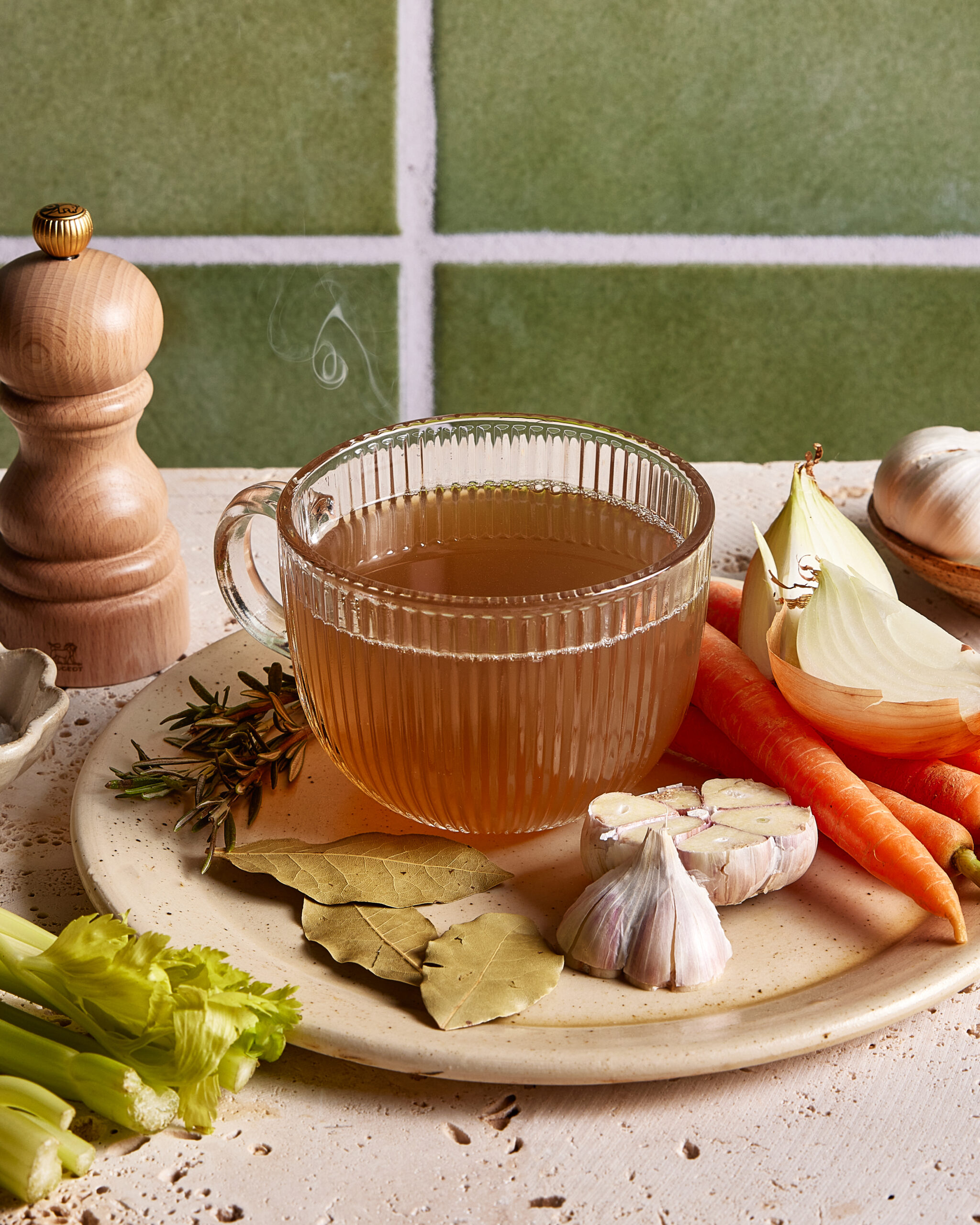
03.

04.
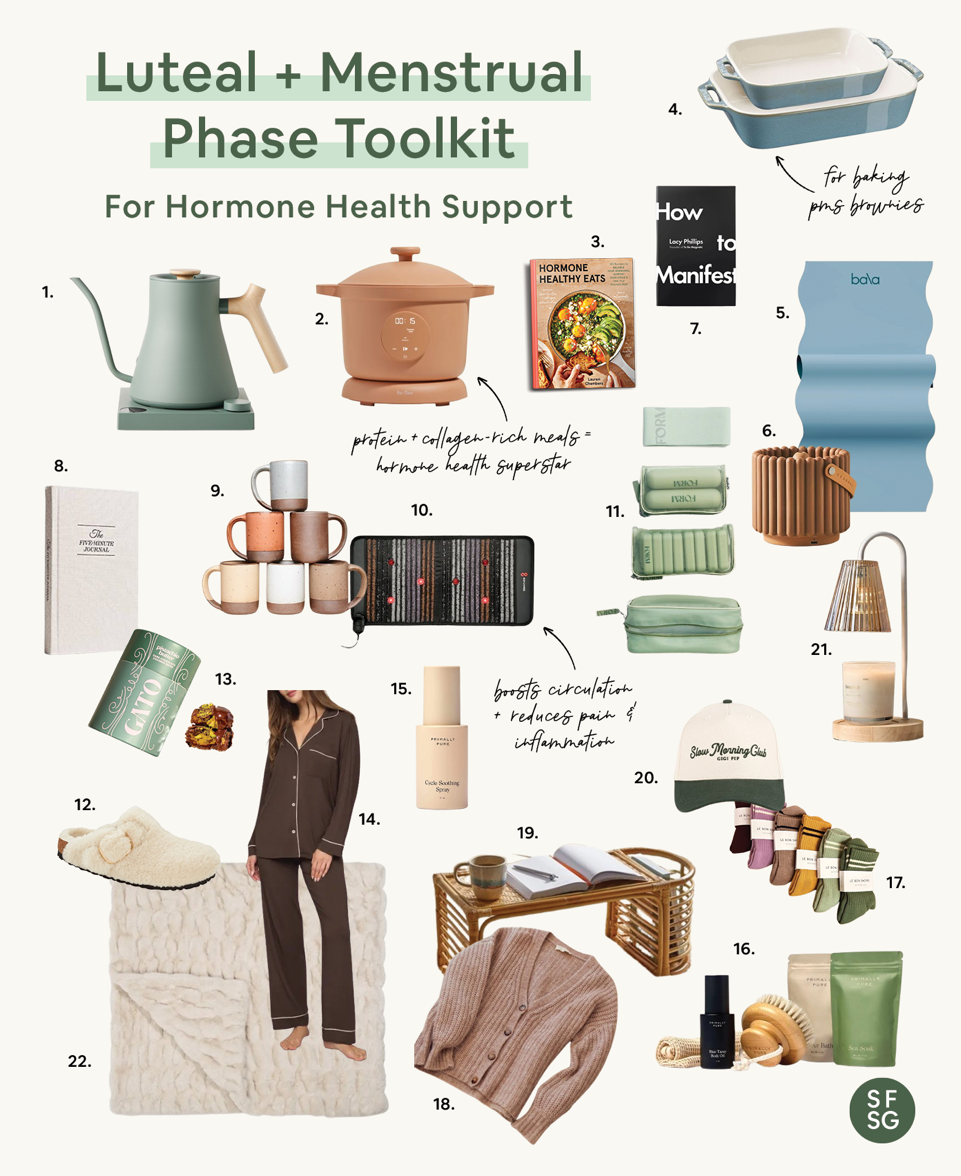
05.
hey!
Keep Browsing
Site
Keep Browsing
Site
the
about
e-books
blog
downloads
quiz
Welcome friend, I'm lauren.
I’m honored to support you on your journey to optimal hormone health + happiness. Thanks for being here babe.
